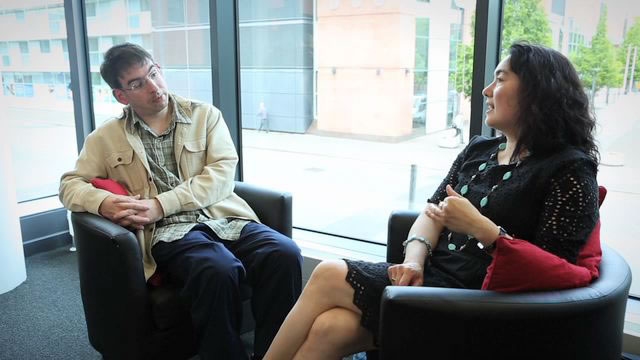Duncan Honeybourne — Living on the Autistic Spectrum
Duncan Honeybourne’s life and career as a professional musician has been shaped - directly and indirectly - by his autism. Since receiving his diagnosis in 1999 he has also become well-known nationwide as a thought-provoking and entertaining lecturer on his experience of life on the autistic spectrum. He has given talks and presentations on a wide range of autism-related topics, including ‘Before and After Diagnosis’, ‘Autism and the Workplace’, friendships, relationships and ‘making sense of social rules and hierarchies’. He is an experienced and inspiring communicator who has lectured at many conferences and events and has delivered insights and training to parents, teachers and other professionals. He now devotes part of his time exclusively to raising awareness and promoting understanding of autistic spectrum conditions.

Part of a series of films for the Manchester Camerata/
Royal Exchange Theatre Songlines project.
In 2012 he was commissioned to make a series of short films on autism for the Manchester Camerata/Royal Exchange Theatre Songlines project.
Watch the series of 11 short films about autism
Some reactions to Duncan’s talks about living with an Autism Spectrum Condition:
“Amusing, candid and courageous”
“Duncan should be bottled and given to every parent and professional – to demonstrate just what can be achieved with thought and consideration of autism”
“He is an inspiration, really good – it has helped me understand some of my daughter’s issues”
“I was moved and impressed by Duncan – thank you for the sincerity and honesty – a superb education for us”
Talk/Lecture content
Duncan has given lectures and presentations on many autism-related topics. The following three talks are examples, but he is happy to structure content and emphasis according to the requirements of a specific context or event. Please feel free to make contact if you would like to discuss possibilities.
As a guideline, each of these talks can be adapted to last between 30 minutes and 1 hour.
Life before and after diagnosis
In this talk, Duncan looks back to his life before diagnosis. He recalls a childhood which, although happy, was marred by a sense of isolation and apartness. He describes watching other people as though they were behind a screen, and he relates his inner anguish at being unable to successfully and competently participate in the “game” of life. His literal, autistic perceptions emerge through sharp and entertaining recollection and observation, and he describes the tangles into which he was drawn via his undiagnosed Aspergers. Following a nervous breakdown at the age of twenty-one, Duncan received a diagnosis of autism, and he tells how he was at last able to learn to know and accept himself.
Autism and the Workplace
Duncan is fortunate to have carved a varied and satisfying career in which he works closely and creatively with a wide range of people. Whilst this success might suggest that he has largely overcome many of the social difficulties identified with those on the autistic spectrum, he nonetheless still finds many aspects of social interaction immensely difficult and stressful. In this frank and illuminating talk Duncan demonstrates that, whilst he strives to achieve and maintain professional success, his autistically-wired brain is inescapably different from “the norm” and he describes how essential it is for him to remain in touch and accepting of this in order to flower professionally and socially. He discusses ways in which being autistic has directly influenced his career choices and examines elements of his own work and of his approach to other human beings which may be affected by his autism. Many of these differences emerge as strong, positive and beneficially challenging, yet Duncan insists that perspective and communication must be maintained in order to avoid potential misunderstanding and conflict in the workplace. Self-awareness and openness are promoted as key values, and Duncan’s own subtle and insidious manifestations of autism are treated with candour and humour throughout.
Friendships, relationships and learning to make sense of social rules and hierarchies
In this hard-hitting talk, Duncan underlines the isolation and confusion inherent in life as an autistic person. He recalls his own anxieties and frustrations at trying to create friendships and relationships, and his attempts at copying the behaviour of others in order to make the imaginative, and thus the actual, leap into being “normal”. He articulates how bizarre and baffling the world’s social hierarchies and rules of acceptable behaviour can appear to him and others on the autism spectrum, and explains how frightening it is to struggle to learn - clumsily and by painstaking analysis and mimicry - what others can do automatically and perfectly. Duncan paints a bleak picture of the “disability” of being on the autistic spectrum but highlights a warm optimism that much can be achieved with self-awareness and the educated understanding and acceptance of others. Thus he stresses his mission to raise awareness of autistic spectrum conditions, and he tells the story of the many nourishing and enriching friendships he has enjoyed. He offers a range of strategies which have been useful to him and to other autistic people in establishing positive connections with others and in addressing misunderstanding and prejudice.
